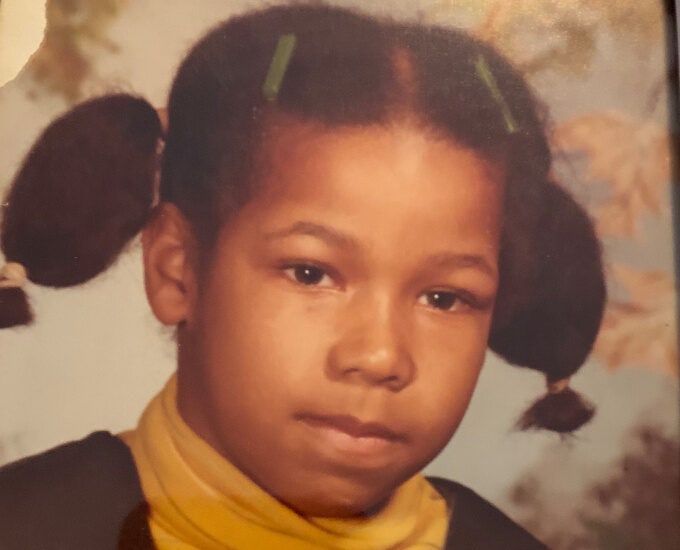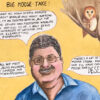
KJIPUKTUK (Halifax) – The Nova Scotia Advocate has always been honoured to publish the amazing writing of Angela Bowden, whether it’s her poetry, her memoirs and essays, or the speeches she gives at rallies whenever yet another racist happening in the province demands a response.
Just recently she published a collection of her poetry, Unspoken Truth, published by Pottersfield Press, and available at your local independent bookstore.
In this interview with Angee we explore some of the themes of her book, and how growing up Black in New Glasgow shaped her and helped her recognize the deeply traumatic impact of racism on generations of Black Nova Scotians.
We’ve published some really strong pieces that are about growing up Black in New Glasgow. To what extent have these experiences shaped you?
On my nightstand there is a picture of me, actually it’s the picture that goes with that story you’re referencing. I’m in about grade two, I believe. That picture is there as a reminder, because that little girl is very influential in my writing, and I often go back and speak to her. Through my writing I’m actually healing her, and in a way healing all the little girls like her.

These days lots of people are struggling to understand all these racial tensions we read about in the news. Well, I’ve been grappling with this for a long time, ever since I was a little girl. I grew up in the Black community in New Glasgow, and I was raised in the church. My grandfather was a deacon, all my uncles were deacons, my auntie is a minister. We would go to our church, to the church groups, we went to the community centre, we played in the community playground, and we really had no concept of race. We just played, as children do.
See also: Review: Jim Crow also lived here – Growing up Black in New Glasgow, Nova Scotia
It wasn’t until we went out into the larger community that these contradictions around who we were and who we thought we were came into play. Those experiences really shaped my writing, because now I look back and try to make sense of it all.
And it isn’t just the Black community that is affected. This is also about the larger community, our white peers in the school system and in society altogether. When I tell a story of me walking home as a young girl, and someone throwing a cup of McDonald’s pop at me, full of ice, and it hits me in the leg, I remember that vividly. But the thrower of that cup has to remember that too.
We grew up in this mess of things that we didn’t really quite understand. I’m hoping to provide some validation for people in the community, like, Oh my gosh, I’m not going crazy, yes, these things did happen, they were traumatic. They shaped who we were.
You are a poet, but you are also an activist. To what extent are these activities separate?
The poetry, the activism, the writing, it’s all sewn together with the same thread, they’re intertwined. Because I write for one purpose. The whole focus of my writing is to validate the emotional suffering and the intergenerational trauma of my people. I want to provide that panoramic view into the trauma, so that people can understand the cruel conditions that Black people have been living with for centuries, with no help, no treatment, no therapy, not even with an acknowledgement.

My book includes three poems by members of my family. There’s a poem in there written by my aunt Karen which she wrote when she was in grade nine in the 60s. My other auntie wrote a poem in the 70s, and it’s profound. and then my mom wrote a poem in 2004. As it turns out there were a lot of writers in my family, and these women had thoughts about what was going on in the world around them. They were producing this Black feminist thought, and it was critically important to include those three pieces in this book because in a way they’re in conversation with each other, and as such they capture the essence of what this book is intended to do.
On writing
I’ve been writing for a very long time, ever since elementary school, I did puppet plays at the church, I wrote little skits for the kids, and I was always writing in some form. So my dream has always been to become a published author, and to see this actually happening, it’s almost unreal because I never expected that.
I’m a community-minded individual and I’m always working towards the betterment of my community. To have this book published is more than a personal dream come true, because it carries so many stories that I’ve heard growing up from the elders, from my mom and my dad, from my family, from the community. It just seemed fitting that the first book that I write unmute their voices.

I read a poem on the occasion of the unveiling of Viola’s Way. And when I read that poem and I looked out into the audience I could see the pain in the faces of our elders. An elder in our community, Frances Dorrington, called me over after that event and she said, you have such a gift, you need to publish a book.
It became really clear to me that our elders, my mum’s generation and those before, had never had their stories heard, they never had their voices unmuted. That was a really important starting point for me.
On Angela’s Nova Scotia Writers Federation mentorship program with Sue Goyette
Sue Goyette said to me, Angee, you don’t need a mentor, you just need someone to help guide you. What she taught me was how to write with perspiration, so to speak. I typically only wrote when I was inspired, when I was angry or feeling another emotion, or to work through some kind of trauma. But just writing to write, I would suck at that, it just wasn’t fun anymore.
Sue would say, writing is work, but it should never hurt. If you think you have nothing to write about, then write about that feeling, write about your feeling that you have nothing to write about. The interesting thing that happened when I did that, is I would maybe get a paragraph in and then something would trigger and I’d write about that. It was almost like a warm-up, like the stretches before exercising. So the mentorship program really helped strengthen my writing as a discipline. I don’t go a week without writing these days, and I could go months without writing something.
See also: Lest we forget, a poem by Angela Bowden

Unspoken Truth, unmuted and unfiltered, by Angela Bowden. Published by Pottersfield Press. Available at your independent bookstore now, and sold at all the usual places.
There will be a virtual poetry reading by Angela on April 29, organized by the Pictou-Antigonish public library.
Check out our new community calendar!
With a special thanks to our generous donors who make publication of the Nova Scotia Advocate possible.
Subscribe to the Nova Scotia Advocate weekly digest and never miss an article again. It’s free!




Remarkable. And to think, ‘it’s only the beginning to a successful literary career!
Congratulations!
I’m so proud of you, sis. Ain’t no stopping you now!